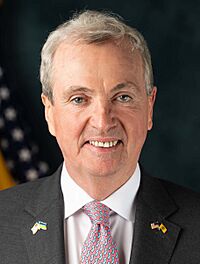Governor of New Jersey facts for kids
Quick facts for kids Governor of New Jersey |
|
|---|---|

|
|
| Style |
|
| Residence | Drumthwacket |
| Seat | Trenton, New Jersey |
| Term length | Four years, renewable once consecutively |
| Constituting instrument | New Jersey Constitution of 1776 |
| Precursor | Governor of New Jersey (Great Britain) |
| Inaugural holder | William Livingston |
| Formation | August 31, 1776 |
| Succession | Line of succession |
| Deputy | Lieutenant Governor of New Jersey |
| Salary | $175,000 |
The governor of New Jersey is the main leader of the U.S. state of New Jersey. This job is chosen by voters and lasts for four years. A governor can serve two terms in a row. After that, they can run for governor again later, but not right away.
The governor's official home is Drumthwacket. This is a large house located in Princeton, New Jersey. The governor's main office is inside the New Jersey State House in Trenton. New Jersey is special because the governor's office is in the same building as the state's lawmakers. It is also one of the few states where the governor's home is not in the state capital.
The first governor of New Jersey was William Livingston. He served from August 31, 1776, to July 25, 1790. A. Harry Moore served the longest as a governor chosen by the people. The current governor is Phil Murphy. He is the 56th governor and a member of the Democratic Party. He started his term on January 16, 2018.
Contents
What the Governor Does
The governor is chosen by the people of New Jersey. They are the political and official leader of the state. The governor handles the state's daily operations. They do not report directly to the federal government. The governor also has other important jobs. For example, they are the commander-in-chief of the New Jersey National Guard. This is true when the Guard is not working for the federal government.
Appointing State Officials
In New Jersey, only the governor and lieutenant governor are chosen by voters statewide. This is different from many other states. In those states, people also vote for some other top officials. Like the president of the United States, the governor picks all the people for their cabinet. The New Jersey Senate must approve these choices.
The governor also chooses all superior court judges. They pick county prosecutors too. However, they usually consider what the state senators want for these jobs. The governor also appoints the New Jersey attorney general and the secretary of state of New Jersey. The Senate must approve these appointments as well.
Governor's Salary
Since January 2002, the governor's salary can be up to $175,000 per year. Governor Phil Murphy accepts the full salary. Former governor Jon Corzine chose to take only $1 per year. Jim McGreevey received $157,000 annually. This was 10% less than the maximum allowed at the time. Chris Christie, who was governor before Murphy, accepted the full salary.
Governor's Security
While in office, the governor has a full-time security team. This team is from the Executive Protection Unit of the New Jersey State Police. After leaving office, a former governor gets a one-person security detail. This security lasts for up to six months.
Governor's Oath of Office
When a new governor starts their job, they say a special promise. This promise is called the "Oath of Office." It shows they will do their best for the state.
The oath says: "I, [name of governor], elected governor of the state of New Jersey, do solemnly promise and swear that I will diligently, faithfully and to the best of my knowledge, execute the said office in conformity with the powers delegated to me; and that I will to the utmost of my skill and ability, promote the peace and prosperity and maintain the lawful rights of the said state. So help me God."
The Lieutenant Governor
On November 8, 2005, voters in New Jersey approved a change to the state's constitution. This change created the job of Lieutenant Governor of New Jersey. This new position started with the 2009 elections.
Before this change, if the governor's job was empty, the President of the New Jersey Senate would become governor. This person would then have a lot of power. They would be a major leader in both the law-making and executive parts of the government.
This change happened because New Jersey State Senate President Richard Codey served as governor twice. He was governor in January 2002. He also served from November 2004 to January 2006. This happened after Governors Christine Todd Whitman and Jim McGreevey resigned.
Kim Guadagno, who used to be a prosecutor, became New Jersey's first lieutenant governor. She started on January 19, 2010, when Chris Christie was governor. After her, former assemblywoman Sheila Oliver became lieutenant governor. She started on January 16, 2018, with Governor Phil Murphy. Sadly, the lieutenant governor position became empty on August 1, 2023, when Sheila Oliver passed away. On September 8, 2023, Governor Murphy chose Tahesha Way to be the third lieutenant governor. She was New Jersey's Secretary of State and will finish Oliver's term.
Learning About Governors
In 2005, a special group was started at Rutgers University. It is called the Center on the American Governor. This center studies the governors of New Jersey. It also looks at governors from other states.
The center has many old documents and pictures. These are from the time when Byrne, Kean, Florio, Whitman, and Corzine were governors. They also have video interviews with people who worked for these governors. The center shares information about other American governors. It also gives updates on all 50 current governors.
Timeline of New Jersey Governors
| Timeline of New Jersey governors |
 |
See also
 In Spanish: Gobernador de Nueva Jersey para niños
In Spanish: Gobernador de Nueva Jersey para niños
- Governorship of Phil Murphy
- List of colonial governors of New Jersey
- List of governors of New Jersey (1776–present)
 | Aurelia Browder |
 | Nannie Helen Burroughs |
 | Michelle Alexander |


